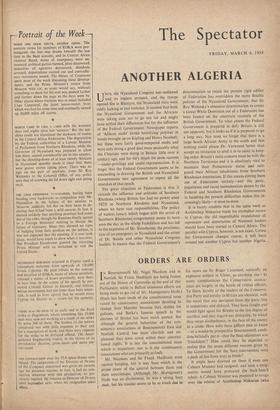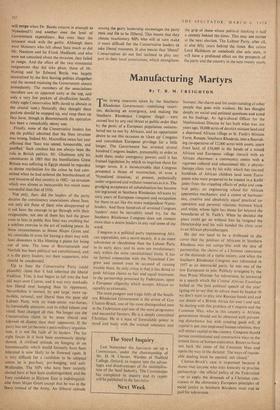ORDERS ARE ORDERS
IN Bournemouth Mr. Nigel Nicolson and in Norfolk Sir Frank Medlicott are being frozen out of the House of Cpmmoits at, the end of this Parliament, while in Belfast strenuous efforts are being made to get rid of Mr. Montgomery Hyde.; Much has been made of the constitutional issue raised by constituency associations deciding to change their Member because they dislike his policies, and Burke's famous speech to the electors of Bristol has been much quoted. But although the general behaviour of the con- stituency associations of Bournemouth East and Norfolk Central has been churlish and un- pleasant they have acted within their constitu- tional rights. It is not the constitutional issue which 'is important; nor is it the constituency associations who are primarily at fault.
Mr. Nicolson and Sir Frank Medlicott, were against hanging, but it was Suez which is the prime cause of the quarrel between them and their associations. (.Although,. Mr. Montgomery Hyde was an abolitionist, he was a strong Suez man; but his trouble seems to be as much due to his views on Sir Roger Casement, naturally an explosive subject in Ulster, as anything else.) In many constituencies the Conservative. associa- tions are largely in the hands of retired officers. To them, loyalty to the leaders of the. Conserva- tive Party and loyalty to Britain are identical, with the result that any deviation from the party line is unpatriotic and disloyal. They have fought and would fight again for Britain to the last degree of sacrifice, and they regard any disloyalty, by which they mean disobedience, in the face of the enemy as a crime. How were these gallant men to know —as a would-be prospective Bournemouth candi- date belatedly put it—that the Suez ultimatum was `fraudulent'? How. could they be expected to realise that the seven different reasons given by the Government for the Suez intervention were a pack of lies from start to finish?
It might have dawned on them if even one Cabinet Minister had resigned; and such a resig- nation would have , protected the back-bench rebels. A Cabinet Minister was prepared to resign over the release of Archbishop Makarios (who will resign when Dr. Banda returns in triumph to Nyasaland?) and another over the level of Government expenditure. But over Suez the innocent stuck with the guilty. Although there were Ministers who felt about Suez much as did Mr. Nicolson and Sir Frank Medlicott, and who were not consulted about the invasion, they failed to resign. And the effect of the two ministerial resignations that did take place, those of Mr. Nutting and Sir Edward Boyle, was largely neutralised by the first leaving politics altogether and the second rejoining the Government almost immediately. The members of the associations therefore saw an apparent unity at the top, and only a very few pockets of disaffection locally. (Only eight Conservative MPs dared to abstain in the crucial vote.) Naturally they thought these pockets should be mopped up, and mop them up they have, though in Bournemouth the operation has been a remarkably messy one.
Finally, none of the Conservative leaders has yet (in public) admitted that the Suez invasion was wrong. Indeed Mr. Macmillan twice last year affirmed that 'Suez was sound, honourable, and justified.' Such conduct has not always been the rule in British politics. Mr. Gladstone told his constituents in 1885 that the humiliations Great Britain was suffering in Egypt should be regarded as divine retribution for the crime he had com- mitted when he had ordered the bombardment of and invasion of that country in 1882—an invasion which was almost as inexcusable but much more successful than that of 1956.
Not only, then, did the leaders of the party deceive the constituency associations about Suez, not only did those of them who disapproved of it not have the courage to go through with their resignations, not one of them has had the grace even to hint in public that Suez was anything but a sublime exercise in the art of making peace. In these circumstances to blame Major Grant and his comrades in arms for having a short way with Suez dissenters is like blaming a piano for being out of tune. The issue at Bournemouth and Norfolk has been political not constitutional, and it is the party leaders, not their supporters, who should be condemned.
Up to Suez the Conservative Party could plausibly claim that it had inherited the liberal tradition. True, it had begun to fall into the bad old ways over Cyprus, and it was very markedly less liberal over hanging than its opponents. Nevertheless it seemed, by and large, more up- to-date, rational, and liberal than the poor old Labour Party with its trade-union war-horses, its formidable amazons, and its tribal taboos and ritual. Suez changed all that. No longer can the Conservatives claim to be more liberal and tolerant of dissent than their opponents. If the party has not yet become a para-military.organisa- tion, it is not the fault of its leaders. The far right forces in it have been enormously streng- thened. A civilised attitude on hanging or on homosexuality which would formerly have been tolerated is now likely to be frowned upon. It is very difficult for a candidate to be adopted unless he is pro-Suez, pro-hanging, and anti- Wolfenden. The MPs who have been recently elected have at best been undistinguished, and the Tory candidate at Harrow East is indistinguish- able from Major Grant except that he was in the Navy instead of the Army. An illiberal attitude
among the party leadership encourages the party rank and file to be illiberal. This means that they choose reactionary MPs who will in turn make it more difficult for the Conservative leaders to take liberal measures. It also means that 'liberal' Conservatives do not feel inclined to play any part in their local associations, which strengthens the grip of those whose political thinking is half a century behind the times. This may not matter at the next election. The Labour Party, after all, is also fifty years behind the times. But unless Lord Hai!sham or somebody else acts soon, it will have a profound effect on the prospects of the party and the country in the next twenty years.



































 Previous page
Previous page